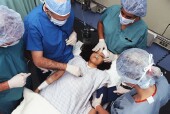
MONDAY, March 14 (HealthDay News) — Quitting smoking eight weeks or less before surgery doesn’t increase a patient’s risk of postoperative complications, say British researchers who reviewed nine previous studies.
“Cigarette smoking has been implicated as a risk factor for postoperative complications across a spectrum of surgical specialties,” according to background information with the study. “Compared with nonsmokers, smokers who undergo surgery have longer hospital stays, higher risk of readmission, are more likely to be admitted to an intensive care unit, and have an increased risk of in-hospital mortality.”
The researchers also noted that existing evidence does not offer clear guidance on when it’s best to quit smoking before surgery.
“When all nine studies are combined, there is no beneficial or detrimental effect of quitting within eight weeks before surgery compared with continue smoking,” wrote Katie Myers and colleagues at Queen Mary University of London, Barts and the London School of Medicine and Dentistry in a news release.
But these findings need to be interpreted with caution, they added.
“Future studies should focus on patients with a very short duration of abstinence and should use biochemical validation of self-reported abstinence. In the meantime, until some new evidence of harm emerges, firm advice to stop smoking and an offer of smoking cessation treatment to those who need it can be provided to pre-surgical patients at any time,” the researchers concluded.
The article appears in the March 14 online edition of the journal Archives of Internal Medicine.
Two of the review co-authors said they have received research funds and act as consultants for companies that make smoking-cessation products.
While the review offers some valuable information, it does not provide a definitive answer, said the authors of an accompanying editorial.
“Physicians should ideally try to get their patients to stop smoking several months prior to their surgery. The appropriate advice regarding the optimal timing of smoking cessation for patients seen close to their scheduled surgery awaits further research,” wrote Clara K. Chow and P.J. Devereaux of the Population Health Research Institute at McMaster University in Hamilton, Canada.
More information
The U.S. Agency for Healthcare Research and Quality has more about surgery.

